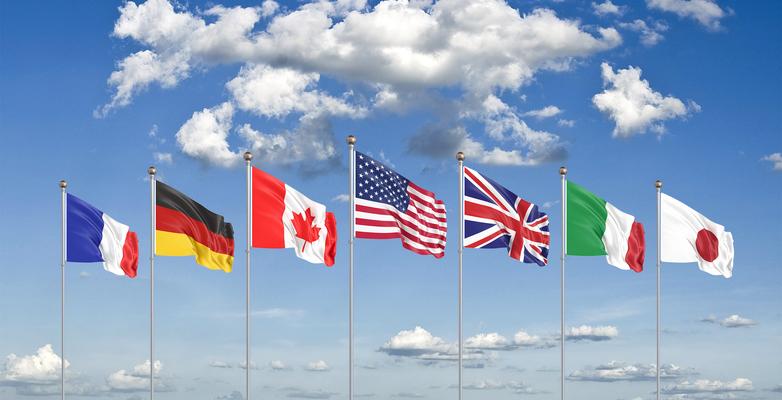
Four Things to Watch for at the G7
5 min read
Well this ought to be a doozy.
Most years, the annual G7 get-together for heads of state from seven wealthy democracies – Canada, France, Germany, Italy, Japan, the UK, and the US – plus the EU hardly registers for most audiences outside of think tank and policy circles.
A few news clips with smiling presidents and prime ministers and headlines about commitments to enhanced cooperation and done.
But 2024 is not most years. When the usual G7 figures meet in Apulia, Italy along with a long list of invited leaders from Brazil, India, South Africa, Saudi Arabia, and others, it's just days after EU elections that fundamentally upended European politics and left the world with more questions than answers.
Top of that list: Who can lead on climate?
An Uncertain Landscape
Notably, the resulting swing to the right in France and Germany in particular means that two of Europe’s leading voices on the issue – French President Emanuel Macron and German Chancellor Olof Schulz – now stand on foundations shakier than sand.
Macron was so shaken by the election results that he dissolved the country’s National Assembly and called for snap elections later this month. Schulz now faces increasing pressure to follow suit with an early election.
While European Commission President Ursula von der Leyen, whose commission fashioned the EU Green Deal, looks positioned to keep her job in the new parliament, questions remain on how aggressive she can be in a second term. British Prime Minister Rishi Sunak arrives with a general election looming on July 4. And then there’s the minor matter of November 5 for US President Joe Biden.
The clear winner on the night was among the most climate-skeptic of the European contingent, Italian Prime Minister Georgia Meloni, whose electoral gains established her as a new kingmaker in the parliament. The clear loser: Greens on the planet’s fastest-warming continent, who lost some 20 seats and significant influence across the bloc.
Still a Critical Role to Play
So what now?
From a climate perspective, the political storms in the background challenge but do not change the urgent need for the G7 to address the new “normal” manifesting in the very real – and record – storms forecast for the Atlantic this year. Or the scorching temperatures projected for Europe again this summer. And on and on.
Because what the G7 does on climate – particularly in transitioning member economies from fossil fuels to clean energy – matters immensely. While the rise of China and other factors means that the G7 has seen its share of global GDP shrink from around 50% in the 1980s to about 30% today, 30% is still a whole lot of influence over the global economy. Especially whether investments in wealthy democracies flow to clean or dirty energy.
Then there is the question of legitimacy. That is, will the rich countries at the head of the table in UN climate negotiations live up to their own bold calls for action when the going gets a little tough? (Because make no mistake, the rest of the world is watching.)
Although G7 summits do not bind members, they serve as a forum to coordinate action on key issues and set a common course. Back in 2022, Olof Scholz proposed making the group a “climate club” to unify and accelerate efforts to reach Paris Agreement targets.
That kind of concerted focus feels a distant memory after this year’s EU elections. There is some assurance in the fact that many of the EU’s more ambitious climate initiatives are already enshrined in law in member states. Though analysts do not expect a U-turn on the Green Deal, they caution that passing more ambitious policies – like the proposal for a 90% emissions reduction target by 2040 – will be difficult. At least in the near term.
But at a time when the world is warming at a pace that has scientists slack-jawed and nations – especially the wealthy G7 – need to rapidly reduce emissions to have any chance of meeting Paris Agreement goals, this is not great news.
So what can leadership look like at this week’s summit and beyond? While significant new commitments might realistically be too much to hope for, we can at least expect – and push – leaders to hold the line on the commitments they’ve already made. In particular, we’ll be looking for tangible steps forward on four key points.
Plans to Phase out Unabated Coal
In April, G7 environment ministers made headlines by agreeing to phase out unabated coal – the dirtiest form of energy and biggest climate threat – by 2035.
This was cause for celebration, for sure, but as with any announcement, the devil’s in the details. And there weren’t a whole lot of those in the announcement. The danger here is that countries use the “transition fuel” label for gas so beloved by oil companies (and sadly codified at COP 28) to simply switch one fossil fuel for another.
What we need to see from G7 leaders is progress on plans to instead replace coal power with new clean energy generation and on a timeline capable of meeting that 2035 date.
Decarbonize the Power Sector by 2035
While we’re talking about gas, we’ll be watching to see how G7 leaders follow up on their 2022 commitment to achieve a fully or largely decarbonized power sector by 2035. If you’ve wondered how we square that commitment with the explosion in new liquified natural gas (LNG) facilities or all the import facilities under construction in Europe, you’re not alone.
While Russia’s invasion of Ukraine made gas a political poker chip worldwide, the simple fact is that we can’t get to a decarbonized power sector if countries keep building new infrastructure locking in emissions for decades to come.
We need to see G7 leaders skip the “transition fuel” trap and offer steps to plan for – and build – largely fossil-free power sectors. Yes, it’s a big ask in today’s political environment, but nature isn’t buying the transition fuel tag – and is crystal clear on the economic devastation ahead if we do.
Plans to End Inefficient Fossil Fuel Subsidies
The April 2024 meeting also ended with G7 members’ commitment to ending inefficient fossil fuel subsidies.
If only they had answered one core question along the way: What makes fossil fuel subsidies inefficient? While the communique eloquently spells out the danger of these subsidies, it does nothing to define them, effectively leaving countries with an LNG supertanker-sized loophole to keep pumping billions into oil and gas.
The trouble is that countries around the world continue to subsidize the very companies and products destroying our climate to the tune of $1.3 trillion (as of 2022). And that’s not counting trillions more in the indirect subsidies they receive from passing on the costs of healthcare bills, extreme weather reconstruction, and other climate impacts to taxpayers.
These subsidies are draining public resources, and the G7’s ambiguity on what does and what doesn’t count as inefficient helps no one but fossil CEOs. We need to see specific criteria – and then steps to end all fossil fuel subsidies.
Clear Commitments to Climate Finance
Environment ministers have also acknowledged the need for climate finance to support a fair energy transition worldwide. But as on so many counts, provided no specifics.
Earlier this week, climate talks aimed at making progress toward a new finance goal for COP 29 later this year in Baku broke down after developed nations refused to put a number on the table.
G7 leaders have a chance to get this process back on track. The stakes are high here. The success of the Paris Agreement process hinges in no small part on a rapid and global transition to clean energy. Which is only possible with significant and equitable climate finance flowing quickly from developed to developing countries. With many developing nations disproportionately suffering from climate impacts they had virtually no role in creating, restoring some trust and goodwill after the breakdown in Bonn will take real commitments from the G7 at a very difficult time.
There will be of course, the temptation to largely avoid the climate issue. But you have to wonder how much further G7 leaders can kick the can down the road when the asphalt is melting? This week may provide some clue.
Take action and tell leaders to end the $1 trillion handout to fossil fuel companies today.




